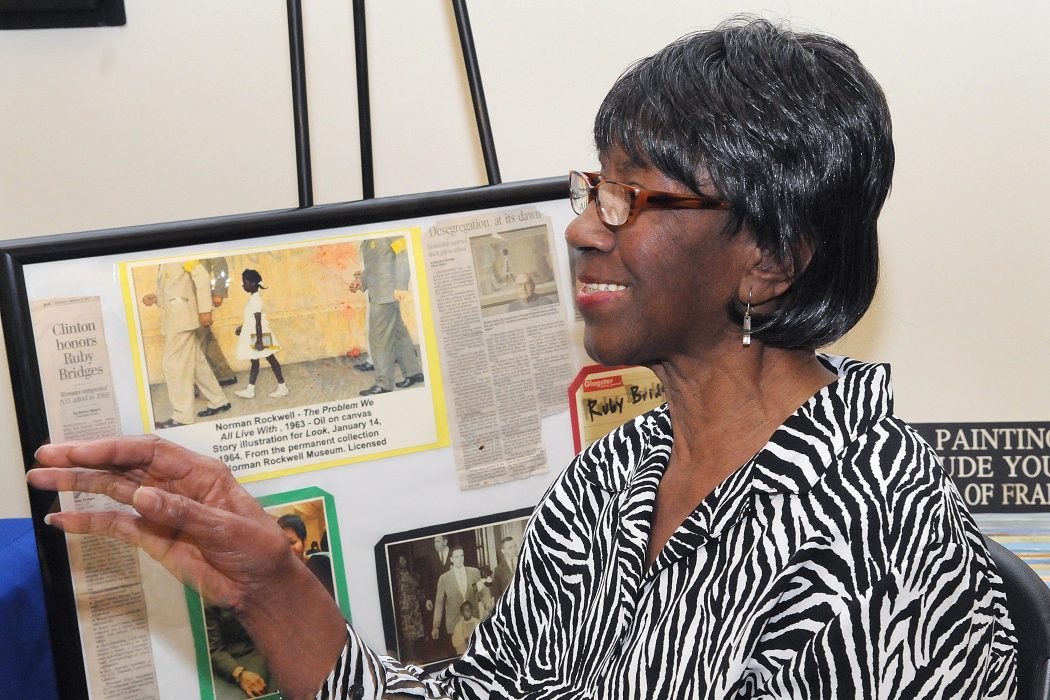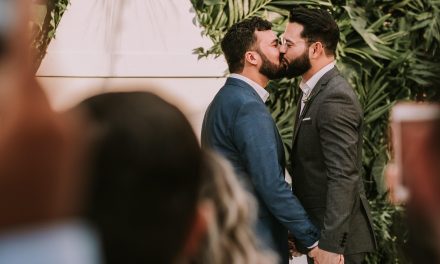(Photo Credits: David Terry, Public domain, via Wikimedia Commons)
How hard was it for you, guys, to go to your elementary school? We know it’s been many years since then but do you still remember?
We are asking because Ms. Lucille Commadore Bridges’ extraordinary story is probably something that is either not known to many or it’s maybe something that’s been long forgotten already. And this is why, today, we would like to pay our respects to Ms. Bridges who passed away from cancer this November 10, 2020.
Her daughter, Ruby Bridges—the first African American student to integrate an elementary school in the South—broke the sad news on Instagram herself saying:
Today our country lost a hero. Brave, progressive, a champion for change. She helped alter the course of so many lives by setting me out on my path as a six year old little girl. Our nation lost a Mother of the Civil Rights Movement today. And I lost my mom. I love you and am grateful for you. May you Rest In Peace.
Meanwhile, New Orleans Mayor LaToya Cantrell took to Twitter to talk about Ms. Bridges’ passing; she described her as “one of the mothers of the Civil Rights Movement in New Orleans.”
Lucille's strength was unbounded during this period. Her husband was reluctant when the request came from the National Association for the Advancement of Colored People (NAACP) to participate.
— Mayor LaToya Cantrell (@mayorcantrell) November 11, 2020
Today, folks recall Ruby as the little girl depicted in Norman Rockwell's painting 'The Problem We All Live With,' and more recently might see a reimagining of the image now including Vice President-elect Kamala Harris walking alongside little Ruby. pic.twitter.com/0Yrwm1mQeY
— Mayor LaToya Cantrell (@mayorcantrell) November 11, 2020
Like every other story, hers began with “once upon a time.”
Once upon a time, the U.S. had a segregated education system. It was not until May 17, 1954 that the U.S. Supreme Court struck down the country’s “separate but equal” doctrine, ending school segregation through the landmark case Brown v. The Board of Education.
Ms. Bridges, a Black woman, gave birth to her daughter Ruby that same year.
Six years later, on Nov. 14, 1960, she brought Ruby to William Frantz Elementary School—an all-white school in New Orleans—for her first day. They were, however, escorted by federal marshals and they were met by protesters who hurled eggs and tomatoes and screamed, “Two, four, six, eight, we don’t want to integrate!”
The marshals, who she said “were heavily armed and kept a machine gun in their car” had protected them and kept them from being struck. Lucille Bridges said, “And that’s the way we lived it for a whole year.”
Ms. Bridges would later say in a 2016 interview that they were blocked by two city police officers that day when they were already at the school doors, telling them that they could not go in. Two of the marshals they were with however, had said, “The United States president said we can.”
But the family’s troubles did not stop there. Lucille and her husband, Abon, lost their jobs because they dared to enroll their daughter to an all-white school and the family had to be supported by the N.A.A.C.P. for a number of years. Moreover, their friends—they reportedly lived in an all-Black neighborhood—had to take turns guarding their home and because of the continued protests, Ms. Bridges would escort Ruby to her school every day for a whole year.
Today, that incident 60 years ago is immortalized in the Norman Rockwell painting titled “The Problem We All Live With.” It shows her daughter Ruby as she was being escorted by the four marshals to school.
In an interview with The New York Times, Ruby Bridges, an author and activist, described her mother as someone who was “very determined,” and someone who “took education very seriously.” Ruby Bridges explained, “I think it was because it was something that neither her nor my father was allowed to have. And ultimately that’s what she wanted for her kids — having a better life for them.”
Lucille Bridges’ advice to the children of today was for the kids to: “Study, listen to what their teachers tell them, and their mothers and fathers.” She added, “After they get their education, they can be any person they wanted to be: doctors, lawyers or anything. But you have to have that education, and I would love for them to just listen to my story so they can know how hard it was for my kids to go to school.”
Ms. Bridges was the daughter of sharecroppers Curtis and Amy Commadore. After attending eighth grade, she stopped going to school in order to help her parents in the fields. Read more about her here.
Rest in peace, Lucille Bridges, and thank you for being an agent of change in education.










Interesting how we Native Peoples have had to suffer far more indignities, and yet our stories remain untold. Couldn’t speak our native languages in school without getting the ruler you our hand, couldn’t vote nor openly practice out various beliefs in public until 1963. We Native Peoples fought in every war of this great nation and are still treated worse than blacks.
the left care only about exploiting race for political gain. if they cared about blacks theyd manage the cities better by reducing crime and ceasing to deprive black children of a good education a a safe lpace to live. Most major cities have been democrat run for decades with nothing to show for it. But the left keep shouting racism and like trained seals they get dumbasses to riot and burn
it is sad. But not for the left whatever it takes to get power
Wow. OK, let’s break this down. “the left care [sic] only about exploiting race…” We can’t say that about Trump, can we? He didn’t try and blanket-ban Muslim visitors and insult all Mexicans just in his first month in office to impress his base, did he? And he claims to have “done more for Blacks” than anyone but Lincoln? That’s beyond insulting. “…theyd [sic] manage the cities better…” Once upon a time, whites ran cities. Black populations grew and whites fled. Blacks had never held the reins of power, and when the whites fled, they took their money, influence, institutional… Read more »
You’re the bomb!
Well said, I concur!! There’s obviously another “dumbass” on here. SMH!!!
As a nation both sides are rather exploitive, “as a pragmatic people (black people) we choose the less evil” you’re choosing to see one side of the coin, for obvious reasons. We people of color, women, and LGBT-etc., and the “common wealth” of course are the reason democracy exists . . . so that the country period could move forward, see, it’s not just about black people . . . it’s for the under-dogs period aside from the elite-white hetero male . . . get that through you thick-head, thanks ;-). The jury has been for out decades, where have… Read more »
Jim. I don’t know Native Peoples are getting treated worst than blacks but it might as well be right up there. My grandfather who was Chickasaw had his land taken from him because white men wanted it. He couldn’t go to the law because the law didn’t care about him and the injustices. He lived at a time where lynching were common, weekly! Today black people are getting killed daily and the ones that we know about are because it is on someone’s cellphone. Native American’s are dying everyday because many are not allowed proper medical care and some places… Read more »
So you’re mad at black people for getting a small bit of recognition on a small article on A4A? Why not suggest a article on the continued suffering of native americans instead of crashing this article bitching about how native americans are treated…
Well said Kevin! I will respond to that post directly although I very much echo what you’ve already said.
True …native americans are treated awful in this country… And thats a fact …but this article is NOT about native Americans… Demand A4A do a article on your people …thats how that works… Instead of being bitter about african americans getting recognition and being upset that your people are not “treated better” than african americans…
it’s not about their people/your people…
we are all humans.
I couldn’t agree more!
Tell HIM that…not ME…LOL…
Kevin, I wholeheartedly agree with you 100%!! Just to clarify when I commented on Dave’s reply to this post, I was agreeing generally that we are human beings. However we are very much different races, ethnicities, cultures and creeds. That’s to be respected, acknowledged and celebrated not dismissed or frowned upon! I hasten to add I am not accusing anyone of such. Just wanted to clarify my points, so there’s ‘overstanding’.
Native American’s must stop this foolishness. Why did you have to go there? Why would you allow you mind to turn against a very poignant article and taint it with division and hate between two minority groups. You need to self reflect and never allow your mental capacity to divide between two groups that are fighting for the same rights and privileges.
Praying for you my brother. Yes I said my brother because we are all human.
Closed mouths don’t get fed. While you letting animosity stew about the Native American story, which I have doubts that you are truly Native American; However, I could not care less one way or the other… Did your people fight for rights to be heard and acknowledged, or did you ride on the Civil Rights activism of the African American [like the LGBTQIA]? Lastly, if you feel you had it much worse than African Americans, which I could debate, why are you bedding down with the white man or white woman?
Sadly Jim, your comments seem hostile and angry towards Black people that were and in many cases even now, are still enslaved and to this very day are very much oppressed and hated. You should seriously think about redirecting that anger and hostility towards the people that have and still are oppressing what you consider to be your “Native people”. Complaining about being “treated worse than blacks”, is showing a side to you that is ignorant, lacking sensitivity and above all else, crass!
Maybe I hear more about the indigenous people of Canada. Canadian Broadcasting Company [CBC] does stories of children taken from their parents to be educated at boarding schools. Sexual abuse of idigenous boys by a now deceased Catholic priest. Murder of female sexual workers being high in number and not aggressively prosecuted. Fetal alcohol syndrome. Adolescent mental and behavioural deficits as a result. An unaware Dr. saying to the other people at the break room table, “If I never treat another ‘Inuit’ it will be too soon.” The other medical professionals leaving him at the table to eat alone. The… Read more »
Great blog about Mrs Lucille Bridges. Truly an inspiration then and now. I’d never heard of her until I read her story here. So well done Dave (A4A) for shining a light on another great ‘Shero’ within the Black community. Her courage, grace and tenacity was and still is a glowing example that crossed boundaries and colour lines. She challenged an overtly deep-seated racist, unfair and shameful policy that should never have been sanctioned in the first place! Lucille Bridges; another name I can add to my long list of people to be proud of that look like me but… Read more »
Well written and you beautifully said everything I wanted to say. Amazing how times have changed in regard to educational choices..
Thanks Marcus, appreciate your acknowledgement. And yes indeed times have changed. Although a lot more still needs to be done. Black history (pre & post slavery) and the great African Americans and African-Caribbeans that made history and contributed to society on a global scale needs to be fairly and freely taught in places of learning starting from Pre School (in my opinion). There’s still a vast disparity and a deliberate lack of Black history within the educational system, certainly here in the UK and this must be addressed forthwith!
RIP Ruby. Like her namesake she shined brightly, she truly benefited from the efforts those that stepped in front of her to protect her right to an education. But historically Little Ruby didn’t attend school to be a poster child for School integration. Instead at the time Ruby attended school in an attempt to get an education for herself, and to educate the rest of us as a society. Her accomplishments at the time benefited only herself and a few limited others, but once noted by those outside of the wall of racism, her accomplishments allowed untold numbers to finally… Read more »
How snarky can you get, ridiculous. It’s about making history, the first black & female vice president . . . in the “1st WORLD.”
As we still (black folk), make great strides against all uphill, wind in the face-odds . . . that’s really something for ‘us’ to celebrate.
May she rest in divine peace for helping to make history.